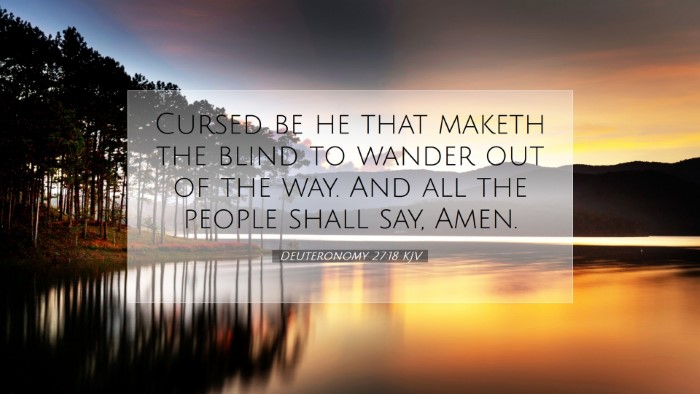Bible Commentary on Deuteronomy 27:18
Verse: "Cursed be he that maketh the blind to wander out of the way. And all the people shall say, Amen." (Deuteronomy 27:18)
The passage from Deuteronomy 27:18 is part of a collection of curses meant to set forth the moral law and the consequences of transgressing it. This verse stands out as it addresses a specific ethical violation against the vulnerable. Herein lies an opportunity to explore its meanings and implications through the lenses of various public domain commentators.
Context and Importance
This verse is situated within the Mosaic Covenant, where God outlines blessings for obedience and curses for disobedience. This particular curse targets those who would take advantage of the blind, an act that undermines justice and compassion, values central to the Hebrew Law.
Commentary Insights
Matthew Henry
Matthew Henry provides a robust exploration of the moral implications of this curse. He notes that the act of causing a blind person to stray from their path symbolizes a broader moral failing. Henry emphasizes that this commandment highlights God’s care for the needy and frail, explicitly condemning any form of exploitation or malice directed at the vulnerable.
- Moral Responsibility: Henry points out that this verse demands that individuals be vigilant about their actions, especially in relation to those who are disabled or helpless. The curse reflects God’s judgment upon those who disregard the dignity of others.
- Public Accountability: The communal response of "Amen" serves as a reminder that the community shares a responsibility in upholding justice. It reinforces the idea that protecting the vulnerable is not just a personal obligation but a societal one.
Albert Barnes
Albert Barnes expands on the historical and theological context of this curse. He argues that the laws given were not merely for ancient Israel but serve as timeless principles applicable to all societies. Barnes reflects on the societal structures that could lead to the oppression of the weak.
- Social Injustice: Barnes highlights that the punishment associated with misleading those who cannot see reveals the justice of God. It shows that God is acutely aware of all injustices, particularly those inflicted upon the helpless.
- Symbolic Meaning: He further implies that this curse can be viewed symbolically; in a spiritual sense, leading anyone away from truth and righteousness is akin to blinding them. This correlation reflects a universal truth about moral guidance.
Adam Clarke
Adam Clarke offers a critical examination of the legal and ethical dimensions encapsulated in this verse. He relates it to broader themes of equity and compassion found throughout biblical law.
- Ethical Framework: Clarke elegantly outlines that this commandment not only condemns physical acts of malice but also speaks to the heart behind one’s actions. It demands a high standard of ethical behavior in society.
- Prevention and Protection: Clarke notes that the emphasis on cursing those who exploit the blind calls for proactive measures to protect the most vulnerable members of society, urging leaders and laymen alike to ensure justice prevails.
Theological Reflections
The theological implications of this verse can be profound, especially regarding God’s character. The curse reflects God’s commitment to justice, His opposition to exploitation, and His overarching desire for an ethical community.
Furthermore, this passage invites reflection on how contemporary society addresses disabilities, particularly regarding advocacy, inclusion, and respect for all individuals, drawing parallels with the core message of the Gospel that champions care for the marginalized.
Practical Applications
There are several practical applications that can be drawn from Deuteronomy 27:18:
- Advocacy for the Vulnerable: Believers are called to advocate for those who cannot advocate for themselves, ensuring that societal structures are in place to protect the blind and other vulnerable populations.
- Community Responsibility: This verse challenges congregations to foster an environment of accountability in which the exploitation of the less fortunate is checked and condemned. It underscores the need for communal acknowledgment of both justice and mercy.
- Personal Reflection: Individuals should reflect on how their actions may inadvertently lead others astray, particularly in moral or spiritual contexts. How we guide fellow believers—especially those who are new or struggling—has lasting repercussions.
Conclusion
In conclusion, Deuteronomy 27:18 presents a powerful reminder of God’s justice and care for the marginalized. Through the insights of Matthew Henry, Albert Barnes, and Adam Clarke, we glean a deeper understanding of the ethical, social, and theological dimensions of this verse. Its implications extend beyond ancient Israel, inviting pastors, students, and theologians alike to engage actively in addressing injustices in modern society.


